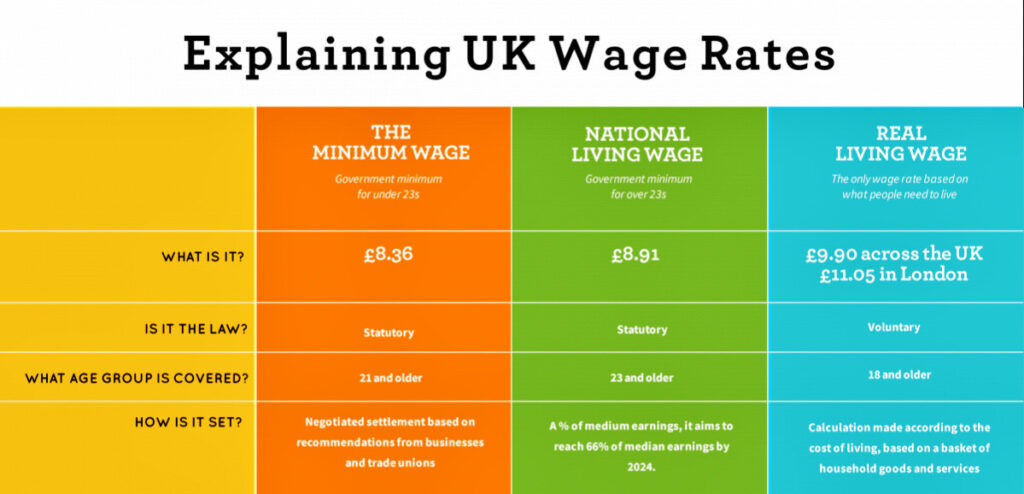What is the Living Wage?
With so many different terms being bandied about recently, we thought it an excellent time to break down what ‘The Living Wage’ actually means, and what advantages its adoption would mean for your business.
The Living Wage is an hourly rate calculated on an estimate of what families need to live on comfortably.

So, what are the differences between the Living Wage, the National Minimum Wage and the National Living Wage?
- The National Minimum Wage (NMW) is the minimum compulsory pay per hour to which almost all workers are entitled.
- The National Living Wage (NLW) is higher than the National Minimum Wage and applies to workers over 23 years of age. It is a statutory figure.
- The Living Wage (LW) is different in that it is a voluntary rate of pay that employers are being encouraged to pay their employees.
The Living Wage has potentially never been more important than in this time of the supposed “Great Resignation”.
Increasing rates of pay might not solve all the recruitment problems that the perfect storm of Brexit and the Covid-19 pandemic have created, but it could go some way to differentiate your business from businesses who are only paying statutory minimum wages.
The sectors that have been affected significantly recently are cleaning, catering, hospitality and care sector –hard hit, for different reasons, during the pandemic.
Employers are reporting significant problems recruiting. But will increasing pay to the Living Wage be enough to differentiate a business in order to attract staff and to retain the talent?
Why pay the Living Wage?
Paying the Living Wage isn’t just about trying to solve recruitment problems in your business, though.
While it may help you to attract more applicants and people with a higher skillset, it will also bring benefits to your employees that translate into positive results for your business. By paying your current employees the living wage, you can make a positive impact on their lives and promote loyalty.
If you’re employing people on lower wages, they can struggle with their finances, and this will have a negative impact on their morale and performance while they are at work. By paying the Living Wage, you not only help your employees to live in a more manageable fashion, but you also reduce their stress levels, and give them more disposable income to spend within the community. Above all, they will feel valued by you. Pay is the most important workfactor in so many people’s lives, and a small increase may make a massive difference to them.
The financial wellbeing of your employees is an important consideration for a healthy business model, and can make the difference between your business being seen as a positive and sustainable employer or a corporate business that is only focused on profit. Employees become invested in workplaces that value them.
What about the costs to the business?
Of course it will cost you more to pay your employees the Living Wage, but it’s an investment. Think of this in the same way that you would think of buying a new software system for work, or buying a particular piece of equipment. You have to spend money in the beginning to gain benefit from it in the medium to long term. By investing in your employees right from the start, it will make them feel valued. Valued employees are more likely to be happier and more productive, and even stay with the business longer. Reduced financial stress translates to lower rates of absence.
Are there any negatives?
In our opinion, no.
Paying the Living Wage has so many benefits for you, your business, your employees, and the wider community. We’ve all seen the significant impact that the pandemic has had on local businesses as a result of them being closed and people being out of work and not having access to the disposable income they previously had.
Helping the whole community by ensuring that your employees can spend their disposable income in the area is another way in which your business can be perceived and valued as a positive player in the community.
15-19 November 2021 is #LivingWageWeek
Why not join EffectiveHRM and become Real Living Wage employer?
You can find out more about the Living Wage from the website of the Living Wage Foundation

